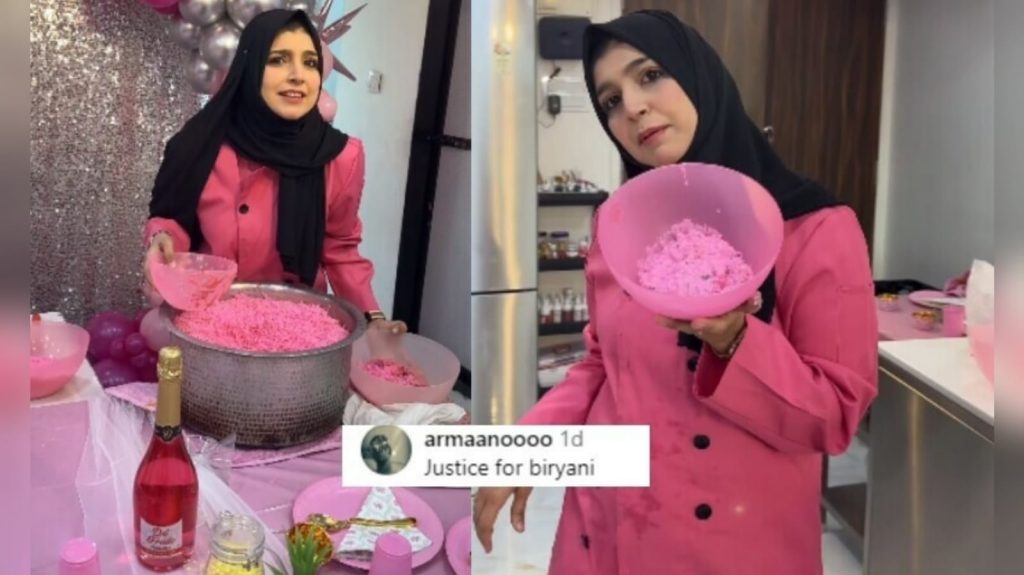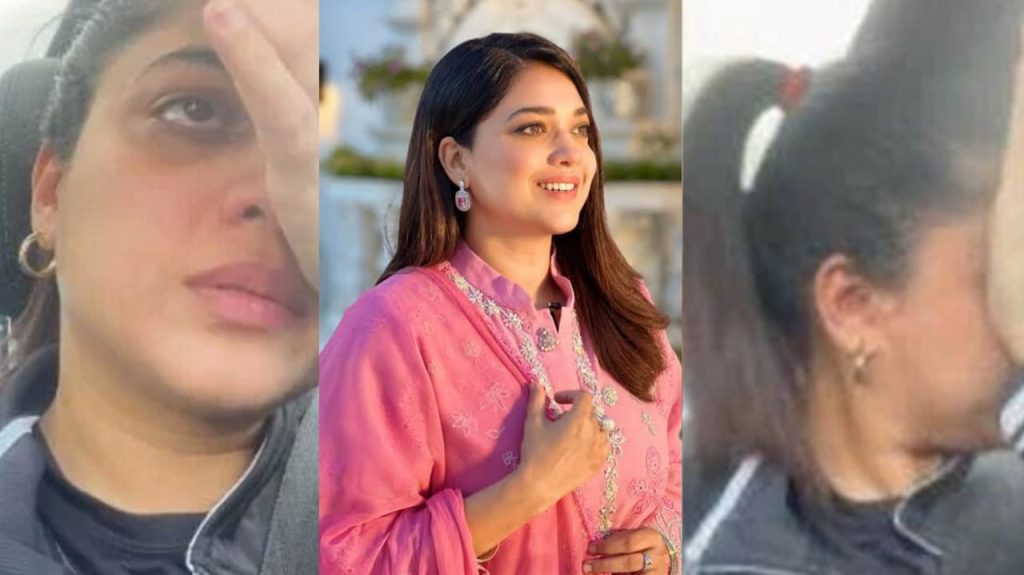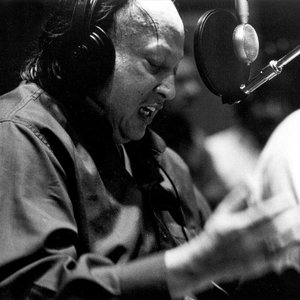


Introduction – Nusrat Fateh Ali Khan (1948 – 1997)
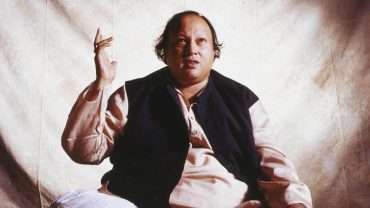

 Nusrat Fateh Ali Khan was a Pakistani legend Qawwal and a Musician, the reverential music of the Sufis. Amplifying the 600-year old Qawwali convention of his family, Khan is generally attributed with acquainting Qawwali music with worldwide groups of onlookers. He is prevalently branded as “Shahenshah-e-Qawwali”, signifying “The King of Kings of Qawwali”.
Nusrat Fateh Ali Khan was a Pakistani legend Qawwal and a Musician, the reverential music of the Sufis. Amplifying the 600-year old Qawwali convention of his family, Khan is generally attributed with acquainting Qawwali music with worldwide groups of onlookers. He is prevalently branded as “Shahenshah-e-Qawwali”, signifying “The King of Kings of Qawwali”.
At the age of 16 years, he had his first ever public performance at his father’s chehlum. He turned into the leader of the family qawwali party in 1971. He was marked by Oriental Star Agencies, Birmingham, England, in the mid-1980s. He went ahead to discharge motion picture scores and collections in Europe, India, Japan, Pakistan, and the United States. He occupied with coordinated efforts and tryouts with Western craftsmen and visited widely, performing in more than 40 nations.
Personal Life
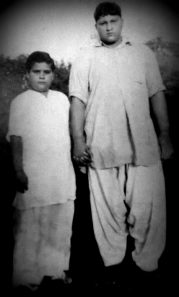

 Nusrat Fateh Ali Khan was born on October 13, 1948 in a Punjabi Muslim family in Faisalabad, not long after the partition of India in 1947 throughout which his family had relocated to Pakistan from their local city of Jalandhar in East Punjab, British India. His family was settled in their genealogical house at Basti Sheik, Jalandhar before the partition. He was the first son of the student of musicology, singer, musician, and qawwal Fateh Ali Khan. Nusrat had four older sisters and one younger brother, Farrukh Fateh Ali Khan (father of Rahat Fateh Ali Khan). Nusrat Fateh Ali Khan wedded his first cousin, Naheed. She was the daughter of his uncle, Salamat Ali Khan in 1979. They had one girl, Nida.
Nusrat Fateh Ali Khan was born on October 13, 1948 in a Punjabi Muslim family in Faisalabad, not long after the partition of India in 1947 throughout which his family had relocated to Pakistan from their local city of Jalandhar in East Punjab, British India. His family was settled in their genealogical house at Basti Sheik, Jalandhar before the partition. He was the first son of the student of musicology, singer, musician, and qawwal Fateh Ali Khan. Nusrat had four older sisters and one younger brother, Farrukh Fateh Ali Khan (father of Rahat Fateh Ali Khan). Nusrat Fateh Ali Khan wedded his first cousin, Naheed. She was the daughter of his uncle, Salamat Ali Khan in 1979. They had one girl, Nida.
The custom of qawwali in the family had gone down through progressive eras for just about 600 years. In the beginning, his dad did not need Khan to take after the family’s occupation. He wanted Nusrat to choose a well-thought-of profession like doctor or engineer since he felt Qawwali craftsmen had less societal position. Be that as it may, Nusrat proved such an ability and enthusiasm for Qawwali that his dad at last changed his mind.
Beginning of Career
He started by taking in the tabla before proceeding onward to singings. His father passed away in 1964, leaving his melodic training under the control and observations of his fatherly uncles, Mubarak Ali Khan and Salamat Ali Khan. In 1971, after the passing of his uncle Mubarak Ali Khan, Nusrat turned into the official pioneer of the family Qawwali party and the gathering got to be distinctly acknowledged as Nusrat Fateh Ali Khan, Mujahid Mubarak Ali Khan and Party. His first open execution as the pioneer of the Qawwali gathering was at a studio recording transmission as a component of a yearly music celebration sorted out by Radio Pakistan, recognized as Jashn-e-Baharan. He sang essentially in Urdu and Punjabi and every so often in Persian, Braj Bhasha and Hindi. His first real hit in Pakistan was the tune Haq Ali, which was performed in a customary style and with conventional equipment. The tune included controlled utilization of his sargam inventions.
Main Career
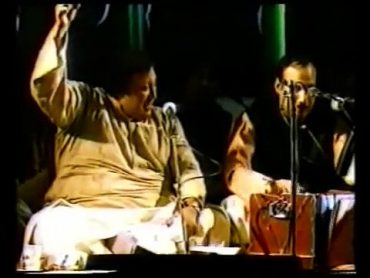

 In the late spring of 1985, he gave the performance at the World of Music, Arts and Dance (WOMAD) celebration in London. Then he gave performances in Paris in 1985 and 1988. He initially went to Japan in 1987, at the request of the Japan Foundation. He gave the performance at the fifth Asian Traditional Performing Art Festival in Japan. He additionally performed at Brooklyn Academy of Music, New York in 1989, gaining him profound respect from the American group of onlookers. He was a Visiting Performer in the Ethnomusicology office at the University of Washington, Seattle, Washington, the United States in 1992, 1993 educational year.
In the late spring of 1985, he gave the performance at the World of Music, Arts and Dance (WOMAD) celebration in London. Then he gave performances in Paris in 1985 and 1988. He initially went to Japan in 1987, at the request of the Japan Foundation. He gave the performance at the fifth Asian Traditional Performing Art Festival in Japan. He additionally performed at Brooklyn Academy of Music, New York in 1989, gaining him profound respect from the American group of onlookers. He was a Visiting Performer in the Ethnomusicology office at the University of Washington, Seattle, Washington, the United States in 1992, 1993 educational year.
It is a challenging mission for an artist to give performance in front of the global audience yet Nusrat Fateh justified this talent by entertaining the world in an iconic way. Indeed, even the individuals who did not know the dialect, were still ready to narrate with his music and comprehend his feelings. It was this capacity to frame an association with the group of onlookers that compensated him with such distinction. He once stated, “In my mind I knew I needed to perform to them. The dialect of music is around the world, worldwide. Cadence and Sur is not reliant on any dialect.”
He cooperated with Peter Gabriel on the recording to The Last Temptation of Christ in 1988, with Canadian artist Michael Brook on the collections Mustt (1990) and Night Song (1996). The alliance with Peter Gabriel gave him the chance to portray his tunes by mixing his qawwalis with the Western music. He additionally assembled with Pearl Jam’s lead artist Eddie Vedder in 1995 on two melodies for the recording to Dead Man Walking.
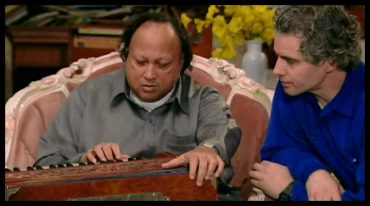

 Peter Gabriel’s Real World brand far ahead discharged five collections of Nusrat’s customary Qawwali, along with few of his experimental work that comprised the collection Mustt Mustt and Star Rise. He contributed lyrics to The Prayer Cycle, which was assembled by Jonathan Elias, yet deceased afore the songs could be finished. Alanis Morissette was gotten to sing with his uncompleted lyrics. In 2002, Gabriel incorporated Nusrat’s lyrics after his death discharged song “Flag to Noise” on his collection “Up”.
Peter Gabriel’s Real World brand far ahead discharged five collections of Nusrat’s customary Qawwali, along with few of his experimental work that comprised the collection Mustt Mustt and Star Rise. He contributed lyrics to The Prayer Cycle, which was assembled by Jonathan Elias, yet deceased afore the songs could be finished. Alanis Morissette was gotten to sing with his uncompleted lyrics. In 2002, Gabriel incorporated Nusrat’s lyrics after his death discharged song “Flag to Noise” on his collection “Up”.
His collection Intoxicated Spirit was selected for a Grammy grant in 1997 for best conventional and traditional collection. His collection Night Song was additionally selected for a Grammy Award for Best World Music Album the same year, yet missed out to The Chieftains’ collection Santiago.
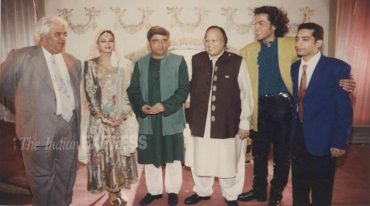


Before long previously his expiry, he formed music for three Bollywood movies, which incorporates the film Aur Pyaar Ho Gaya, in which he additionally sang for “Koi Jaane Koi Na Jaane” onscreen with the lead combine, and “Zindagi Jhoom Kar”; He likewise made music for Kartoos, where he sang for “Ishq Da Rutba”, and “Bahaa Na Aansoo”, together with Udit Narayan. He passed away very soon preceding the motion picture’s discharge.
His last music work for Bollywood was for the film, Kachche Dhaage, where he sang in “Iss Shaan-E-Karam Ka Kya Kehna”. The film was discharged in 1999, two years after his passing. It is prominent that the two renowned singing associates of Bollywood, Asha Bhosle and Lata Mangeshkar sang for the melodies he created in his short spell in Bollywood. He sang “Saya Bhi Saath Jab Chhod Jaye” for Sunny Deol’s film Dillagi. The tune was discharged in 1999, two years after Khan’s passing. He likewise sang “Dulhe Ka Sehra” from the Bollywood motion picture Dhadkan which was discharged in the year 2000.
He contributed the tune “Gurus of Peace” to the collection Vande Mataram, made by A. R. Rahman, and discharged to rejoice the 50th anniversary of India’s freedom. A.R Rahman was a big fan of Nusrat Fateh Ali Khan. A.R Rahman could not makemore songs with him. A.R Rahman far ahead discharged a collection titled Gurus of Peace, which included “Allah Hoo” by Nusrat Khan as an honor. A.R Rahman’s 2007 melody “Tere Bina” was likewise created as an honor to him.
Honors and Grants
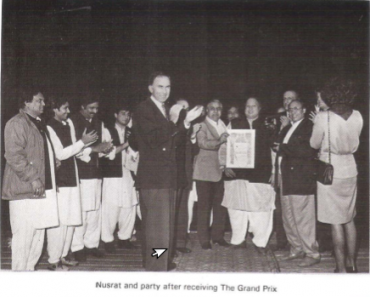

 Nusrat Fateh Ali Khan is broadly thought to be the most imperative qawwal ever. Listening to Nusrat is not only music, it is a demonstration of love. In 1987, he got the President of Pakistan’s Award for Pride of Performance for his commitment to Pakistani music. In 1995, he got the UNESCO Music Prize. In 1996 he was granted Grand Prix des Amériques at Montreal World Film Festival for brilliant support to the talent of silver screen. Around the same time, he got the Arts and Culture Prize of the Fukuoka Asian Culture Prizes. In Japan, he was likewise recognized as the “Singing Buddha”. He got the “Legends” grant at the UK Asian Music Awards in 2005. Time magazine of 6 November 2006, published “60 Years of Asian Heroes”, records him as one of the main 12 specialists and scholars in the most recent 60 years. He likewise showed up on NPR’s 50 extraordinary voices list in 2010. In August 2010 he was incorporated into CNN’s catalogue of the twenty most famous performers from the previous fifty years. He was registered at fourteenth position in UGO’s record of the best vocalists ever in the year 2008. Numerous privileged awards were presented to Khan amid his 25-year music profession. He was given the label of Ustad afterward performing traditional composition at a gathering in Lahore on his father’s bereavement anniversary.
Nusrat Fateh Ali Khan is broadly thought to be the most imperative qawwal ever. Listening to Nusrat is not only music, it is a demonstration of love. In 1987, he got the President of Pakistan’s Award for Pride of Performance for his commitment to Pakistani music. In 1995, he got the UNESCO Music Prize. In 1996 he was granted Grand Prix des Amériques at Montreal World Film Festival for brilliant support to the talent of silver screen. Around the same time, he got the Arts and Culture Prize of the Fukuoka Asian Culture Prizes. In Japan, he was likewise recognized as the “Singing Buddha”. He got the “Legends” grant at the UK Asian Music Awards in 2005. Time magazine of 6 November 2006, published “60 Years of Asian Heroes”, records him as one of the main 12 specialists and scholars in the most recent 60 years. He likewise showed up on NPR’s 50 extraordinary voices list in 2010. In August 2010 he was incorporated into CNN’s catalogue of the twenty most famous performers from the previous fifty years. He was registered at fourteenth position in UGO’s record of the best vocalists ever in the year 2008. Numerous privileged awards were presented to Khan amid his 25-year music profession. He was given the label of Ustad afterward performing traditional composition at a gathering in Lahore on his father’s bereavement anniversary.
Nobilities, Bequest and Inspiration
With his expressive melodies to hypnotic words, mystic variations of pitch, shared with rhyme that blisters the hearts, Nusrat’s music travels the listener into a totally different state. He was a role model for musicians whose music knew no restrictions and affected even individuals who were unlucky to not comprehend his words, but blessed enough to sense them being immersed by their depths.
Nusrat Fateh Ali Khan is frequently recognized as one of the originators of “world music”. Broadly applauded for his divine charm and attractiveness and unique energy, he was the first and one of the most vital specialists to promote Qawwali, then deliberated a “secret holy custom”, to Western crowds. His influential singing performances, which could last more than 10 hours, delivered an obsession for his music throughout the whole Europe.
Jeff Buckley referred to Nusrat Fateh Ali Khan as a noteworthy impact, saying “He’s my Elvis”, and playing out the firstly few minutes of Khan’s smash “Yeh Jo Halka Halka Suroor Hai” at live shows. Numerous different specialists have additionally referred to Khan as an impact. Writer and neuroscientist Sam Harris referred to Khan as one of his most loved artists ever.
Paul Williams picked a show execution by Khan for consideration in his 2000 book The twentieth Century’s Greatest Hits: a ‘main 40’ list, in which he gives a section each to what he deliberates the main 40 imaginative accomplishments of the twentieth century in any field. The Derek Trucks Band covers Khan’s melodies on two of their studio collections. Their 2002 collection Joyful Noise incorporates a front of “Maki Madni”, which highlights a special performance by his nephew Rahat Fateh Ali Khan. 2005’s Songlines incorporates a mixture of two of Nusrat’s melodies, “Sahib Teri Bandi” and “Maki Madni”. This mixture initially showed up on the band’s live collection Live at Georgia Theater, which was discharged in 2004
A group called Brooklyn Qawwali Party was shaped in New York City in 2004 by instrumentalist Brook Martinez to play out the music of Nusrat Fateh. The band still plays out generally jazz styles with instruments of qawwalis of Nusrat Fateh by the tools traditionally linked with jazz instead of the ones related with qawwali.
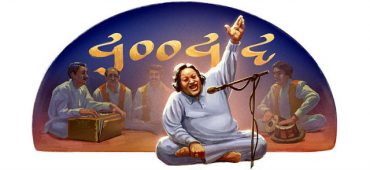

 Google paid a tribute to Nusrat Fateh on October 13, 2015 on the occasion of his 67th birthday with a picture on its Web page for India, Pakistan, and Japan and among different nations calling him the individual “who opened the world’s ears to the rich, mesmerizing hints of the Sufis”. On account of his incredible voice, Khan brought world music to the world, said Google
Google paid a tribute to Nusrat Fateh on October 13, 2015 on the occasion of his 67th birthday with a picture on its Web page for India, Pakistan, and Japan and among different nations calling him the individual “who opened the world’s ears to the rich, mesmerizing hints of the Sufis”. On account of his incredible voice, Khan brought world music to the world, said Google
Death
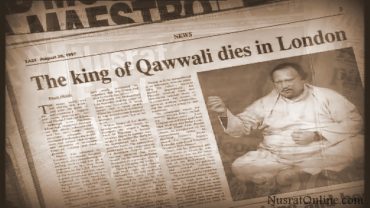

 Nusrat Fateh Ali Khan became seriously ill due to his kidney and liver problems 11 August 1997 in London, during the journey to Los Angeles to get a kidney transplant. He passed away of a sudden heart failure at Cromwell Hospital, London on 16 August 1997, at the age of 48 years. His body was deported to Faisalabad, and his memorial service was a public event. He was covered in Jhang Road Graveyard on Jhang Road, Faisalabad. His wife Naheed Nusrat shifted to Canada after the demise of her husband. She passed away on 13 September 2013 in Credit Valley Hospital in Mississauga, Ontario, Canada. His melodic legacy is currently conveyed forward by his nephew, Rahat Fateh Ali Khan. Rahat was picked by his uncle Nusrat Fateh Ali Khan for mentoring in the customs of Qawwali music and was singing with his uncle and dad by the age of three. When he was seven years old he started formal preparation with his uncle and he performed first time out in the public when he was nine years old at the demise commemoration of his granddad.
Nusrat Fateh Ali Khan became seriously ill due to his kidney and liver problems 11 August 1997 in London, during the journey to Los Angeles to get a kidney transplant. He passed away of a sudden heart failure at Cromwell Hospital, London on 16 August 1997, at the age of 48 years. His body was deported to Faisalabad, and his memorial service was a public event. He was covered in Jhang Road Graveyard on Jhang Road, Faisalabad. His wife Naheed Nusrat shifted to Canada after the demise of her husband. She passed away on 13 September 2013 in Credit Valley Hospital in Mississauga, Ontario, Canada. His melodic legacy is currently conveyed forward by his nephew, Rahat Fateh Ali Khan. Rahat was picked by his uncle Nusrat Fateh Ali Khan for mentoring in the customs of Qawwali music and was singing with his uncle and dad by the age of three. When he was seven years old he started formal preparation with his uncle and he performed first time out in the public when he was nine years old at the demise commemoration of his granddad.








